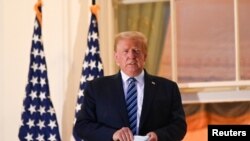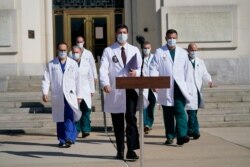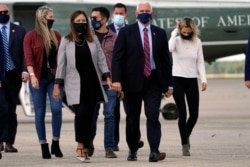U.S. President Donald Trump urged Americans not to “be afraid” of COVID-19 after he returned to the White House Monday evening after 72 hours of hospitalization for the deadly virus.
In a show of fitness, he climbed the steps of the South Portico, standing on the Truman Balcony where he removed his mask, gave a double thumbs-up gesture and saluted the Marine One helicopter as it prepared to take off from the South Lawn. Without putting his facemask back on, the president then walked into the White House where others were awaiting his arrival.
Earlier, as he walked out of the Walter Reed National Military Medical Center,
Trump said, “Thank you very much, everybody.”
Stepping off the helicopter and walking toward the White House residence, the president paused to turn to the cameras, waved and gave a thumbs-up. Asked by VOA how he was feeling, a muffled reply of “real good” could be heard.
Later in the evening, he tweeted out a recorded message about COVID19, saying "Don't let it dominate you. Don't be afraid of it.”
"We're going back, we're going back to work. We're going to be out front,” he said. “Don't let it dominate your lives. Get out there, be careful,” he added.
Next presidential debate
Trump’s reelection campaign said the Republican president, trailing former Vice President Joe Biden in the polls, plans to participate in the Oct. 15 second debate against the Democratic Party nominee.
“Though he may not entirely be out of the woods yet, the team and I agree that all our evaluations, and most importantly, his clinical status, support his return home” to the White House, which has medical facilities and practitioners to monitor the president around the clock, his primary physician, Dr. Sean Conley, told reporters Monday afternoon.
“Every day a patient stays in the hospital unnecessarily is a risk to themselves,” he added. “Right now, there’s nothing being done upstairs here that we can’t safely conduct down home.”
Before leaving the hospital, the president tweeted, "Don’t be afraid of Covid. Don’t let it dominate your life,” adding that he felt better than he did 20 years ago.
Physicians 'cautiously optimistic'
Speaking with reporters at the hospital, Conley, an osteopath and a commander in the U.S. Navy, declined to answer some questions, such as the condition of the president’s lungs, citing patient confidentiality.
The president is taking a steroid, dexamethasone, which is typically not administered in mild or moderate cases of the coronavirus, along with a five-day course of remdesivir, an antiviral medication.
Trump’s physicians remain “cautiously optimistic and on guard, because we’re in a bit of unchartered territory when it comes to a patient that received the therapies he has so early in the course,” Conley said. “If we can get through to Monday with him remaining the same, or improving, better yet, then we will all take that final deep sigh of relief.”
After tweeting a video on Sunday that he was “getting great reports” from his doctors, Trump promised a little surprise for his supporters outside the hospital where he is being treated.
The president then briefly left Walter Reed in an armored SUV with Secret Service agents in tow to drive by a flag-waving, cheering crowd outside the hospital.
Drive by criticism
His decision to do a drive-around for supporters Sunday evening was condemned by one attending physician at Walter Reed as irresponsible.
Dr. James Phillips, who is also chief of disaster medicine at The George Washington University in Washington, tweeted that the special vehicle the president was riding in is sealed against chemical attack.
“The risk of COVID-19 transmission inside is as high as it gets outside of medical procedures. The irresponsibility is astounding. My thoughts are with the Secret Service forced to play,” said Phillips, referring to the driver and an accompanying agent in the front seat who appeared to be wearing masks, face shields and gowns.
“Appropriate precautions were taken in the execution of this movement to protect the president and all those supporting it, including PPE,” White House spokesman, Judd Deere, said. “The movement was cleared by the medical team as safe to do.”
On Monday Conley said the drive was only “for a short period of time,” and the agents in the vehicle with Trump were adequately protected.
Infection date unclear
Earlier Sunday, the doctors treating the president revealed that their patient had earlier experienced “two episodes of transient drops in his oxygen saturation.”
Conley received word last Thursday evening that both Trump and first lady Melania Trump tested positive for the coronavirus after one of the president’s close aides, Hope Hicks, was confirmed to be ill with the infection.
The doctor declined again on Monday, when pressed by reporters, to answer when Trump last tested negative for COVID-19, something considered important for doing adequate contact tracing to try to limit the spread of the virus.
“I don’t want to go backwards,” the physician said. “The contact tracing, as I understand it, is being done. I’m not involved with it.”
Trump’s campaign on Friday put a hold on all previously announced events involving the president’s participation.
Return to campaign trail
Vice President Mike Pence is making campaign appearances this week, as well as facing off Wednesday evening against Sen. Kamala Harris of California, the Democratic vice-presidential nominee.
“As far as travel goes, we’ll see,” Conley replied when asked how soon Trump could get back on the campaign trail with less than a month before the Nov. 3 presidential election.
Doctors said it is important to ensure that the president is no longer shedding virus and that he is in good enough physical shape before getting medical permission to travel.
Trump and Biden were about 4 meters apart on a debate stage last Tuesday in Cleveland, Ohio. The U.S. Centers for Disease Control and Prevention suggests at least 2 meters for social distancing purposes.
Biden’s campaign said the former vice president tested negative Friday for the coronavirus. A test on Sunday was also negative.
The coronavirus has killed 210,000 people in the United States and infected nearly 7.5 million across the country, according to Johns Hopkins University data.














